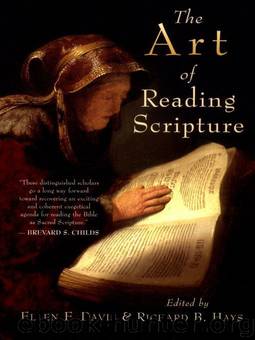The Art of Reading Scripture by Davis Ellen F. & Richard B. Hays

Author:Davis, Ellen F. & Richard B. Hays [Davis, Ellen F.]
Language: eng
Format: epub
Publisher: Eerdmans Publishing Co - A
Published: 2003-10-02T00:00:00+00:00
Many of Gunkel’s points, above all his concern to understand the text for what it is, are well taken. The genre of the text is indeed a key issue, and the recognition that it is legend rather than history (though both of these modern categories need careful definition if they are to be useful) is surely correct, as is his assertion that such a judgment need not be “unkind/skeptical” in such a way as to “diminish” the text; the appropriate bearing of judgments of piety/faith upon the text also remains a live issue. Yet his frame of reference is an aesthetic, indeed strongly Romantic, sensibility that is hardly as self-evident as Gunkel seems to suppose. The imaginative engagement with the text whereby one experiences “heartrending pain” and “infinite thankfulness and joy” seems designed to encourage a kind of emotional roller coaster as a part of the reading experience (akin to what is commonly experienced at the movies), an emotionalism that is at a considerable remove from a reading that engenders obedient submission to the unendurable, incomprehensible, and contradictory.
For all that Gunkel’s proposed aesthetic response to the text differs markedly from that of classic Jewish and Christian spirituality, it can still be classified as broadly “positive” in its stance toward the text. Yet over the last two hundred years there has been a steadily increasing tendency to view the text negatively, as both mistaken in its assumptions and misguided as a reference point for living. A key voice is that of Immanuel Kant at the end of the eighteenth century. Kant polarized philosophy and theology, moral law and religion, always to the advantage of the former:In some cases man can be sure that the voice he hears is not God’s; for if the voice commands him to do something contrary to the moral law, then no matter how majestic the apparition may be, and no matter how it may seem to surpass the whole of nature, he must consider it an illusion. [Here he appends the following as a footnote.] We can use, as an example, the myth of the sacrifice that Abraham was going to make by butchering and burning his only son at God’s command (the poor child, without knowing it, even brought the wood for the fire). Abraham should have replied to this supposedly divine voice: “That I ought not to kill my good son is quite certain. But that you, this apparition, are God — of that I am not certain, and never can be, not even if this voice rings down to me from (visible) heaven.”263
Download
This site does not store any files on its server. We only index and link to content provided by other sites. Please contact the content providers to delete copyright contents if any and email us, we'll remove relevant links or contents immediately.
The Five People You Meet in Heaven by Mitch Albom(3550)
The Secret Power of Speaking God's Word by Joyce Meyer(3167)
Real Sex by Lauren F. Winner(3010)
Name Book, The: Over 10,000 Names--Their Meanings, Origins, and Spiritual Significance by Astoria Dorothy(2978)
The Holy Spirit by Billy Graham(2942)
0041152001443424520 .pdf by Unknown(2843)
How The Mind Works by Steven Pinker(2811)
ESV Study Bible by Crossway(2773)
Ancient Worlds by Michael Scott(2680)
Churchill by Paul Johnson(2577)
The Meaning of the Library by unknow(2564)
The ESV Study Bible by Crossway Bibles(2547)
The Gnostic Gospels by Pagels Elaine(2527)
MOSES THE EGYPTIAN by Jan Assmann(2411)
Jesus by Paul Johnson(2351)
City of Stairs by Robert Jackson Bennett(2339)
The Complete Dead Sea Scrolls in English (7th Edition) (Penguin Classics) by Geza Vermes(2270)
The Nativity by Geza Vermes(2226)
Ancient Near Eastern Thought and the Old Testament by John H. Walton(2221)
